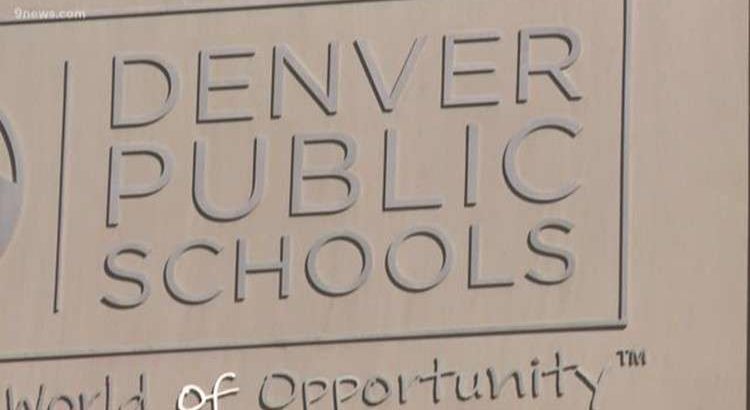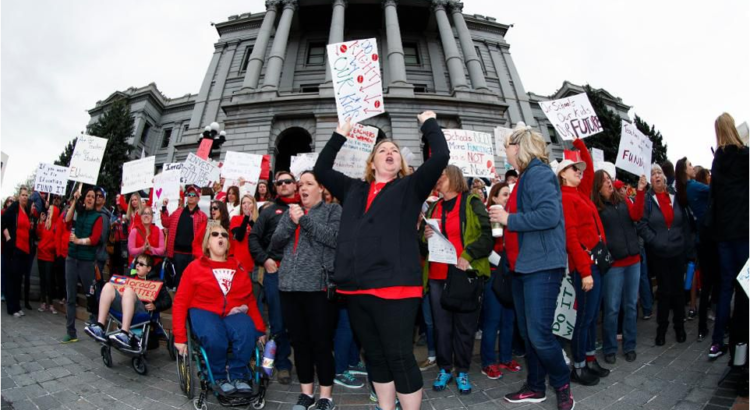North America/ Denver/ 06.02.2019/ Source: www.9news.com.
Here’s a timeline of events related to the strike and contract negotiations in the Denver Public Schools District.
The whole journey started November 1, 2005, when Denver voters approved a new way to pay teachers called ProComp. It’s a system based on giving incentives for improved student performance.
What has happened since then?
WATCH BELOW: A timeline of events in the DPS, DCTA negotiations
March 14, 2018: Denver Public Schools, Denver Classroom Teachers Association negotiate new Master Contract.
The ProComp contract, which is separate, is extended until January 18, 2019. Negotiations continue.
April 27, 2018: Teachers rally at State Capitol
School funding draws statewide and nationwide attention as protesters rally, asking for more money from legislators.
September 2018: Union declares an impasse
The teachers union believes both sides are so far apart that a mediator is needed to help cultivate an agreement. After months of mediation, it remains unsuccessful.
January 8, 2019: Union files intent to strike
The Denver Classroom Teachers Association officially filed with the Department of Labor and Employment its desire to strike, giving the legally required 20-day notice.
January 17, 2019: DPS makes new offer
The school district makes an offer which includes $20 million in new money for teachers pay, increasing the average base salary by 10 percent.
January 18, 2019: ProComp contract expires.
Negotiations go late into the night. The union wants $8 million more in the deal to raise base salaries instead of having more incentives. No deal is made.
January 19, 2019: Strike vote begins
Teachers begin the period of voting on whether to strike.
January 22, 2019: Teachers overwhelming vote to strike
The results are in and more than 90-percent of the teachers who voted want to walk the picket line.
«They’re striking for better pay. They’re striking for our profession and they’re striking for Denver students,» Rob Gould, the teachers’ lead negotiator, said.
January 23, 2019: DPS requests state intervention
Superintendent Susana Cordova formally asked the Department of Labor and Employment to intervene in the labor dispute. By law, the strike is delayed from the scheduled date of January 28 until the state decides whether or not to intervene.
January 28, 2019: Union responds asking the state to stay out
The Denver Classroom Teachers Association filed its official response asking the state to let teachers exercise their right to strike. This starts the legal clock giving the state and/or Governor Jared Polis 14 days to decide whether or not to intervene.
If the state intervenes, it will have 180 days to try to bring both sides together which would delay the strike even further.
If the state does not intervene, teachers will be cleared to strike if a deal is not reached.
January 29, 2019: DPS reaches out to the union to restart negotiations
While everything is on hold, the district wants to restart talks and says it has a new offer for the teachers union.
«We’re trying to be creative about how we can come up with something that looks like more and feels like more what our teachers have asked for,» Cordova said.
January 31, 2019: Teachers union rejects latest offer by DPS
During Thursday’s night’s negotiations, DPS proposed adding $3 million to the deal during the 2020-2021 school year by eliminating 100 positions in the central office. The teachers union responded by calling the new negotiations a «waste of time.»
«Denver teachers are very disappointed that DPS did not take this bargaining session seriously,» a statement from the Denver Classroom Teachers Association says. «The district offered no new ideas for creating a fair, competitive salary schedule that will keep good teachers and special service providers in our schools».
DPS said the new proposal would have committed an estimated $50 million in teacher increases over three years.
“I am disappointed that the DCTA did not engage in the discussion or bring a counter proposal,» Superintendent Susana Cordova said «They chose to leave at 6:45 p.m. when we were scheduled to bargain until 8 pm. We came committed to negotiating, and had anticipated we would have the opportunity to share additional ideas with DCTA about the structure of the new system. We would have been willing to provide a counter-proposal if we had seen one brought forward by the Association.”
Source of the notice: https://www.9news.com/article/news/education/denver-teacher-strike-a-timeline-of-events/73-ece18a14-3b86-442c-9b0b-09b65073f251








 Users Today : 12
Users Today : 12 Total Users : 35460395
Total Users : 35460395 Views Today : 23
Views Today : 23 Total views : 3419186
Total views : 3419186